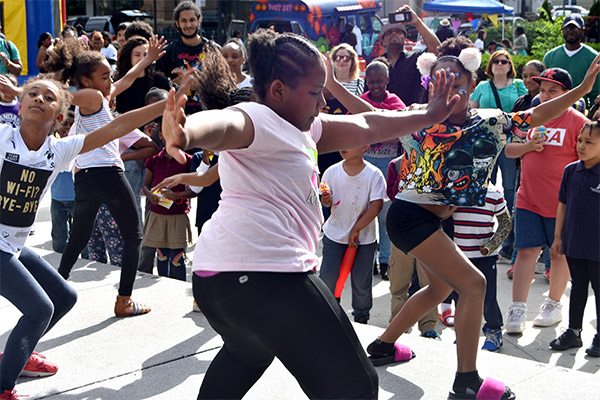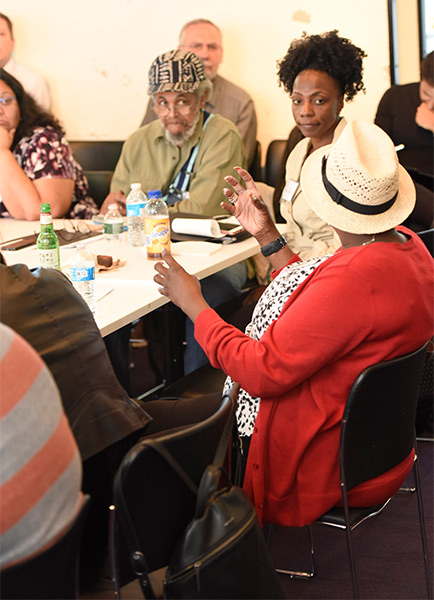
The process
Organized around a series of peer learning modules, the Place Leadership Network strove to create a robust community of practice. For most of the year, neighborhood teams met monthly to explore one another’s places, share ideas, and engage with experts. In the process, the teams built shared vocabulary and a sense of common identity.
The learning year of the Place Leadership Network kicked off with a two-day seminar co-hosted by the Harvard Graduate School of Design. It set the tone for the rest of the year’s programming: heady, challenging, intense, nimble when needed, determined by peers. In the following months, participants spent more than 100 hours together in learning and exploration, hosted some fifty guests who lent insight and resources, and supported one another through the daily challenges of their work -- and through an extraordinary public health crisis. The year culminated in a participatory grantmaking process that distributed $200,000 in unrestricted funds to participants in the initiative.
Program co-design and cohort selection
Over the course of approximately nine months, the Boston Foundation explored the feasibility of launching a pilot initiative that supports vibrant, creative, and inclusive public spaces. Through conversations with community and civic leaders, learning from national peers in philanthropy and community development, and a series of co-design sessions, the Foundation identified a gap in support to place-based organizations in the region. The Place Leadership Network was a direct response that proposed to strengthen community-led, place-based organizations that act as stewards of shared places.
The Foundation launched an open application and promoted it through networks of community development and arts and culture partners, as well as in four community info sessions hosted throughout the region. Intentionally broad, the call for proposals received nearly forty applications from a variety of place-based teams. The review and selection, conducted by a diverse panel, scanned applications for evidence of curiosity and willingness to participate in a learning process; capacity and readiness to lead change in the community; and a clear commitment to spatial justice.
Out of the pool of applicants, eight teams were selected to participate in the pilot cohort. They represent a continuum of neighborhoods, organizational types, and capacities. Seven of the teams are led by BIPOC people, six by women, and three by new Americans.
Learning
The first year of PLN has been structured through a series of monthly learning sessions. Driven by the stated interests and concerns of participants, the day-long sessions featured interactive workshops, community tours, group discussions, and presentations by both guest experts and members of the cohort. Each session is themed around a broad area of inquiry prioritized by participants; each is hosted by a participating team in its community -- a feature that introduces the cohort to the places and practices of their peers.
Themes of the monthly sessions have included the following: universal design of public places, conducted by the City of Boston’s public realm director; inclusive cultural programming, led by the head of cultural districts at Massachusetts Cultural Council; district branding and communications, hosted by global design agency IDEO; economic self-determination, facilitated by the economic consultancy HR&A; and a session focused on the impacts of the COVID-19 pandemic, which invited public health expert Nineequa Blanding and groundbreaking sociologist Eric Klinenberg to share perspectives on community resilience.
Participatory Grantmaking
The pilot initiative concluded with the distribution of $200,000 in unrestricted funding to participating teams. Conceived in the spirit of trust-based philanthropy, the process sought to eliminate conventional barriers such as onerous applications, project proposals, or reporting requirements.
Moreover, participants advocated for the Boston Foundation to further restructure the grantmaking to center collaboration and transparency. Working with the cohort and a community finance expert from the Harvard GSD, the Foundation redesigned the process to be non-competitive -- substantially guaranteeing funding to each team. Rather than requesting an “application” in the first place, the process was driven by participant reflections, which they shared with one another in a transparent format. Finally, teams commented on one another’s applications, lifting up the work of their peers and offering constructive feedback.
Next Steps
As the pilot phase of the Place Leadership Network wraps up, the Foundation has been gratified to share learnings from this body of work with the field. The Foundation is committed to sharing learnings through publications, speaking engagements, policy forums, and other means, Foundation staff and community partners have been amplifying the impact of place-based philanthropy.
We are gratified to be featured by the International Downtown Association, Alliance for the Arts in Research Universities, International Interior Design Association, Boston Society for Architecture, ArtPlace America, the Brookings Institution, Dukakis Center for Regional and Urban Policy, Reimagining the Civic Commons, Rudy Bruner Foundation, Planetizen, and other venues. A Philanthropy Massachusetts panel discussion highlighting the Place Leadership Network is promising to build greater recognition of place-based investment in the region. And Northeastern University is expected to continue an important vector of this work as it pursues a feasibility study for a community-based planning and design center.


